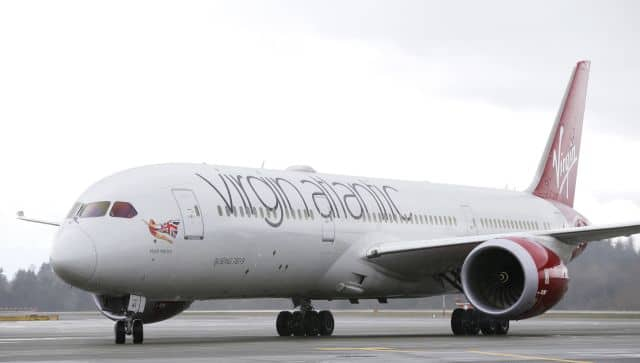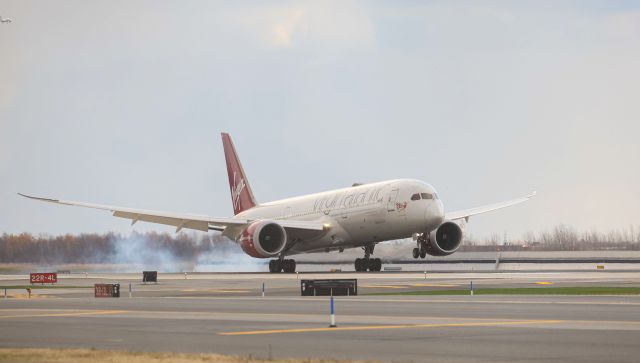It’s the COP28 week. As world leaders descend upon Dubai for the United Nations climate summit, global warming is in the spotlight again. Amid this, comes news of the first transatlantic flight by a passenger aeroplane powered by “sustainable” jet fuel. That sounds like some good news. The flight by the commercial airliner Virgin Atlantic took off from London’s Heathrow and landed at New York’s JFK airport. Partially funded by the UK government, it is seen as a possible greener way of flying. We take a look at the historic flight and if it is really a viable and sustainable option. Also read: How travel is contributing to the Climate Emergency What do we know about this groundbreaking flight? The Virgin Atlantic flight completed the London-to-New York jaunt on Tuesday. It was the first commercial airliner to have flown the long haul using 100 per cent sustainable aviation fuel (SAF). It carried no paying passengers or cargo, according to a Reuters report. A Beoing 787 plane was readying for the flight with 50 tonnes of SAF. Two types of fuel were used – 88 per cent was derived from waste fats and the rest from the waste of corn production in the United States, reports the BBC. The journey from London to New York was approved by the UK regulator, the Civil Aviation Authority, earlier in November, after a test and analysis. Engine maker Rolls-Royce and energy giant BP are some of the companies involved in the project. [caption id=“attachment_13446252” align=“alignnone” width=“640”] Virgin Atlantic departs from Heathrow airport in London. It did not carry any paid passengers or cargo. Reuters[/caption] Why is the flight hailed as historic? Sir Richard Branson, the Virgin Atlantic founder and president, was onboard. He said, “The world will always assume something can’t be done, until you do it.” “It’s going to take a while before we can get enough fuel where everybody’s going to be able to fly. But you’ve got to start somewhere,” he told the media in London before the take-off. According to Shai Weiss, chief executive of the airline, the flight proved that “fossil-derived fuel can be replaced by sustainable aviation fuel”. “It’s really the only pathway to decarbonising long-haul aviation over and above having the youngest fleet in the sky. It is a really momentous achievement,” he was quoted as saying by BBC’s Today programme. He also pointed out that not enough SAF was used but added that the fuel was expensive and hence would drive up prices. [caption id=“attachment_13446282” align=“alignnone” width=“640”]
 The first commercial airliner to cross the Atlantic on a purely high-fat, low-emissions diet flew from London to New York in a step toward achieving what supporters dubbed as ‘jet zero’. File photo/AP[/caption] UK transport secretary Mark Harper, who travelled on the plane, said, that the “100 per cent SAF-powered flight shows how we can decarbonise transport both now and in the future, cutting lifecycle emissions by 70 per cent and inspiring the next generation of solutions.” Talking to BBC Breakfast, he explained that using SAF produced about 70 per cent less carbon emissions than traditional fuels, hailing it as a “really big step forward”. UK prime minister Rishi Sunak said the flight was “a major milestone towards making air travel more environmentally friendly and decarbonising our skies”. He hailed the Virgin Atlantic’s achievement claiming that the flight was “net zero”, a remark which was criticised.
The first commercial airliner to cross the Atlantic on a purely high-fat, low-emissions diet flew from London to New York in a step toward achieving what supporters dubbed as ‘jet zero’. File photo/AP[/caption] UK transport secretary Mark Harper, who travelled on the plane, said, that the “100 per cent SAF-powered flight shows how we can decarbonise transport both now and in the future, cutting lifecycle emissions by 70 per cent and inspiring the next generation of solutions.” Talking to BBC Breakfast, he explained that using SAF produced about 70 per cent less carbon emissions than traditional fuels, hailing it as a “really big step forward”. UK prime minister Rishi Sunak said the flight was “a major milestone towards making air travel more environmentally friendly and decarbonising our skies”. He hailed the Virgin Atlantic’s achievement claiming that the flight was “net zero”, a remark which was criticised.
Right now something very exciting is happening in the sky above us👇 pic.twitter.com/rOoIkfPNqh
— Rishi Sunak (@RishiSunak) November 28, 2023
Is the flight truly green? While airlines see the first transatlantic flight as a milestone, experts have their reservations. Environmental advocacy group Stay Grounded called the flight “a greenwashing distraction”. “What is urgently needed is to reduce the burning of fossil jet fuels, which means reducing flights wherever possible,” said Magdalena Heuwieser, who represents the network. A piece in The Conversation says that the sustainability claims by Virgin were “laughable” and that the latest experiment is “not significantly more sustainable” than the earlier ones. If Virgin is to be believed, the new SAF no longer comes exclusively from crops and it is blended with waste products. “But what of the waste products? Surely reusing cooking oils offers a sustainable solution? Unfortunately, in a notoriously unregulated market, it seems not,” write economics experts Gareth Dale and Josh Moos in The Conversation. “Virgin Atlantic maintains that the SAF it uses is made entirely from used cooking oil. However, if the aviation industry bets big on used cooking oil, it is feared it will turbocharge tropical logging and the extermination of the orangutan and countless other endangered species,” they warn. [caption id=“attachment_13446322” align=“alignnone” width=“640”] British entrepreneur Richard Branson and Virgin Atlantic CEO Shai Weiss speak before a media event marking Virgin Atlantic Boeing 787’s completion of the first 100 per cent SAF transatlantic flight. Weiss said that the flight proved that ‘fossil-derived fuel can be replaced by sustainable aviation fuel’. Reuters[/caption] The policy director of the Aviation Environment Federation campaign group, Cait Hewitt, said that the idea that the UK was closer to “guilt-free flying” because of the flight was “a joke”. For now, the only way to achieve this was to “fly less” and there might be better technology in the future to reduce carbon emissions, reports the BBC. Dr Guy Gratton, associate professor of aviation and the environment at Cranfield University, was quoted as saying by the publication, “We can’t produce a majority of our fuel requirements this way because we just don’t have the feedstocks. And even if you do, these fuels are not true ‘net zeros’.” However, he said that the growing use of SAF was a “stepping stone towards future, genuinely net-zero technologies”. Also read: Up In The Air: From Elon Musk to Rolling Stones, how celebs have recorded 11 years of flying time in one year What are the challenges before the aviation industry? SAF is used in small amounts in the airline industry by blending it with traditional fuel. However, this amounts to less than 0.1 per cent of the aviation fuel used worldwide. Aviation accounts for an estimated two to three per cent of global
carbon emissions . However, it is not an easy industry to decarbonise compared to road travel, reports Reuters. Engines in commercial use are not yet certified to fly on more than 50 percent SAF and the vast majority of flights blend in a much lower amount of SAF with traditional jet fuel. After successful ground tests, Virgin and its partners Rolls-Royce, Boeing, BP and others have won permission to fly using only SAF from the US Federal Aviation Administration, and the Canadian and UK regulators. According to Rolls-Royce CEO Tufan Erginbilgic, SAF was the only solution to decarbonise commercial flights in the medium term. [caption id=“attachment_13446372” align=“alignnone” width=“640”]
Aviation accounts for an estimated two to three per cent of global carbon emissions. File photo/Reuters[/caption] Many European airlines, including Virgin, British Airways, and Air France have said they want to be using 10 per cent SAF by 2030. The industry’s goal of “net zero” emissions by 2050 relies on that share rising to 65 per cent. However, analysts say the 2030 target is difficult to achieve, given SAF’s small volumes and its high cost. In October, the head of International Airlines Group, the parent company of British Airways, warned that there was more than a 90 per cent risk the industry would not meet the European Union mandate for SAF availability in 2025. Others have said governments have not provided enough industry support. With inputs from agencies


)

)
)
)
)
)
)
)
)



